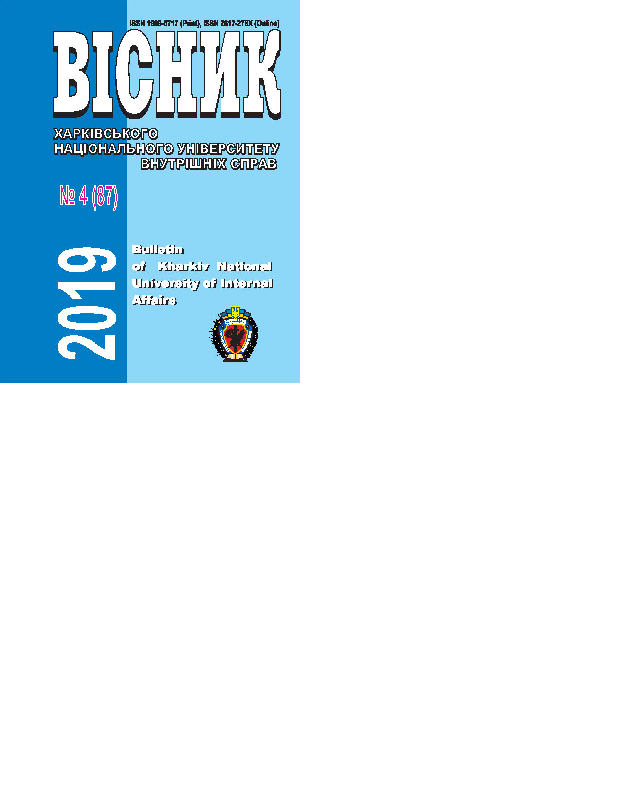Philosophical and Legal Interpretations of the Deformations of Legal Awareness in the XX - Early XXI Century
DOI:
https://doi.org/10.32631/v.2019.4.02Keywords:
legal awareness, deformations of legal awareness, legal nihilism, legal idealism, totalitarian legal awareness.Abstract
It has been stressed that the topic of philosophical and legal interpretations of the deformations of legal awareness in the XX – early XXI century is actively developed by scholars of the countries of the post-Soviet space. Emphasis has been placed on the development of the doctrine on legal nihilism that has been developed in Western European philosophical and legal thought, as well as on the problem of totalitarian legal awareness that has emerged in Soviet society.
It has been revealed that the foundation of the concept of the deformations of legal awareness in Ukrainian philosophical and legal science was laid by the great household names of the past – P. I. Novgorodtsev, I. A. Il`in, M. M. Alekseev, L. I. Petrazhitskii, B. I. Kistiakivskyi and others. There is not so much in the world scientific thought about the deformations of legal awareness, where the concept of legal nihilism is the exception. The foundations of the doctrine of nihilism were laid by such outstanding thinkers as F. Nietzsche, A. Schopenhauer, M. Heidegger, F. H. Jacobi. Therefore, nowadays the doctrine of legal nihilism is the most developed in relation to the types of the deformations of legal awareness.
It has been determined that the “golden age” of this extremely negative social phenomenon occurred at the beginning of the XX century, after the formation of the USSR. Totalitarian propaganda machines, the Soviet Union in particular, tried to transform society into a governed crowd, brainwashed by a certain ideology that led to a degeneration of legal awareness into a totalitarian consciousness and, as a consequence, to the widespread deformation of legal awareness. However, the deformations of legal awareness were not discussed at theoretical level, because they were considered a vestige of bourgeois times.
Discussion about the deformation of legal awareness was initiated by the prominent Soviet legal scholar E. A. Lukasheva in her work “Socialist Legal Awareness and Legality”, where she characterized that the legal awareness of a particular individual can be defective, limited, and backward from the general level of public consciousness, can contain harmful installations and defective assessments of legal phenomena.
Downloads
References
Syrovatskyi V.І., 2013. Destruction of legal consciousness and ways to correct it as an object of philosophical and legal analysis [Destruktsіia pravosvіdomostі ta shliakhy ii vypravlennia yak obiekt fіlosofsko-pravovoho analіzu]. Ph.D. dissertation. Lvіv State University of Internal Affairs.
Cherney V.V., 1999. Overcoming of law nihilism – important condition for building a law state [Podolannia pravovoho nіhіlіzmu – vazhlyva umova rozbudovy pravovoi derzhavy]. Ph.D. dissertation. National Academy of Internal Affairs of Ukraine, Kyiv.
Schopenhauer A., 1992. Collected works [Sobranie sochinenii]: in 2 vols. Vol. 1. Moscow: Moskovskii klub.
Nietzsche F., 2005. The will to power. Experience revaluation of all values [Volya k vlasti. Opyt pereotsenki vsekh tsennostei]. Moscow: Kul`turnaya Revolyutsiya. Available at http://yanko.lib.ru/books/philosoph/nizshe-volya_k_vlasti-l.pdf [Accessed 12 October 2019]. (Transl. Gertsyk E.).
Voronenkov D.N., 1999. Legal nihilism and legal idealism: theoretical and legal research [Pravovoi nigilizm i pravovoi idealizm: teoretiko-pravovoe issledovanie]. Ph.D. dissertation. Kolomna Pedagogical Institute.
Krause W., 1994. Nihilism today, or the patience of history [Nіhіlіzm sohodnі abo terpliachіst іstorіi]. Kyiv: Osnova.
Kalynovskyi Yu.Yu., 2011. Features of origin and general characteristics of totalitarian consciousness [Osoblyvostі vynyknennia ta zahalnі kharakterystyky totalіtarnoi pravosvіdomostі]. Gìleâ – Gileya: scientific herald, Iss. 46, pp. 398-405.
Kalynovskyi, Y.Y., 2012. Paradigmatic dimensions of Ukrainian society’s consciousness [Paradyhmalnі vymіry pravosvіdomostі ukrainskoho suspіlstva]. Kharkiv: Maidan.
Cherkas M.E., 2012. Awareness and its deformation as a factor in optimizing the wrongful conduct of the individual [Deformatsіi pravosvіdomostі yak chynnyky protypravnoi povedіnky osoby]. Deržavne budìvnictvo ta mìsceve samovrâduvannâ. Iss. 23, pp. 58-67.
Lukasheva E.A., 1973. Socialist legal consciousness and rule of law [Sotsialisticheskoe pravosoznanie i zakonnost`]. Mosow: Yuridicheskaya literatura.
Petrov V.R., 2000. Deformation of the legal consciousness of Russian citizens: problems of theory and practice [Deformatsiya pravosoznaniya grazhdan Rossii: problemy teorii i praktiki]. Ph.D. dissertation. Nizhny Novgorod Academy of the Ministry of Internal Affairs of the Russian Federation.
Kudryavtsev V.N., 1992. Social deformations. Reasons, mechanisms and ways of overcoming [Social`nye deformatsii. Prichiny, mekhanizmy i puti preodoleniya]. Moscow: Izdatel`stvo IGiP RAN.
Matuzov N.I., 1994. Legal nihilism and legal idealism as two sides of the “same coin” [Pravovoi nigilizm i pravovoi idealizm kak dve storony “odnoj medali”]. Pravovedenie, No. 2, pp. 3-16.
Baranov P.P., 1991. Professional legal awareness of IAA employees: theoretical problems [Professional`noe pravosoznanie rabotnikov OVD (teoreticheskie problem)]. Moscow: MYuZSh.
Groshev A.V., 1997. Functions of legal consciousness in the mechanism of criminal law regulation [Funktsii pravosoznaniya v mekhanizme ugolovno-pravovogo regulirovaniya]. D.Sc. dissertation. Ural State Law Academy, Ekaterinburg.
Kovalenko O., 2017. An ex-deputy of Russian State Duma was killed in Kyiv [U Kyievі vbyly eks-deputata Derzhdumy RF]. [online] Urkainska Pravda. 23 March 2017. Available at http://www.pravda.com.ua/news/2017/03/23/7139031 [Accessed 12 October 2019].



